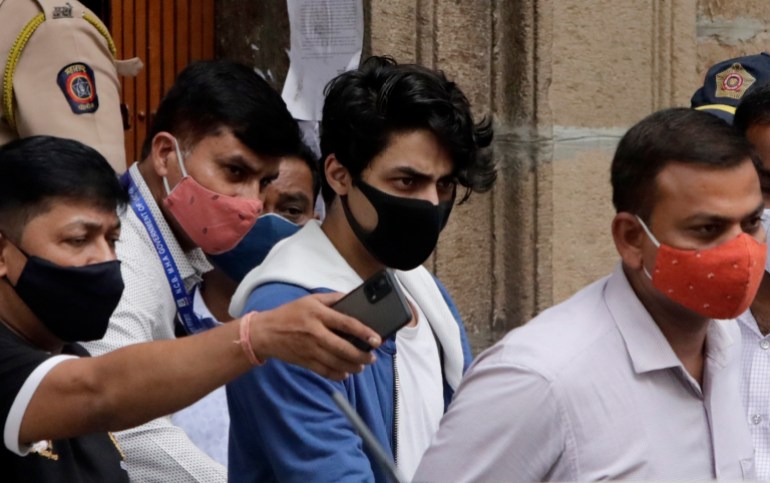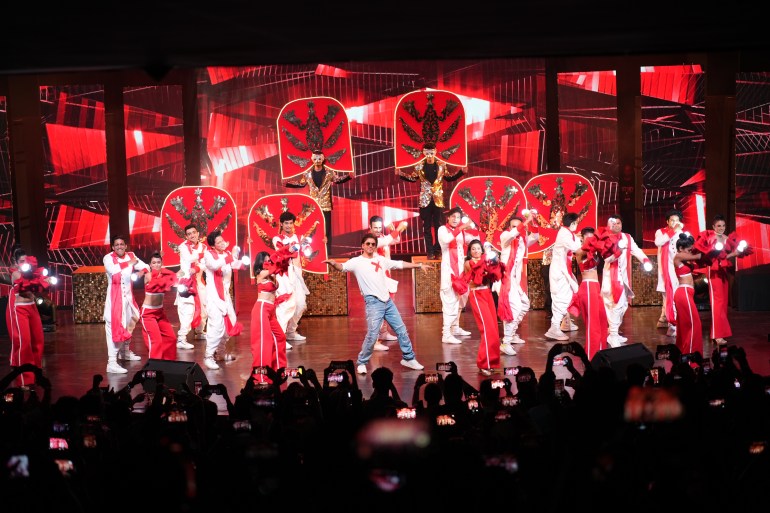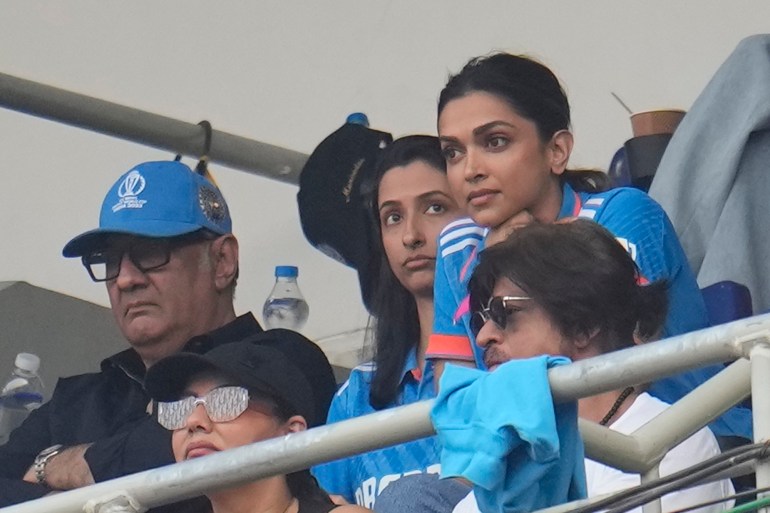Reclaiming Bollywood, Shah Rukh Khan style
Sudhir Kothari, 36, a financial analyst and adviser based in the southern Indian city of Chennai, has ordered a special five-kilogramme (11-pound) choco-truffle cake, garlands and booked dhol (drum) players. The T-shirts, badges and wristbands that he had ordered arrived in time and Rohini Silver Screens theatre has allowed him to erect a 7.4-metre (25-foot) cutout of Bollywood star Shah Rukh Khan for the special 9am “First Day, First Show” of Dunki, Khan’s new film that releases worldwide on Thursday.
A diehard “SKRian”, as Khan’s fans call themselves, Kothari told Al Jazeera that in 2013, three to four days after “SRK sir started following me, I turned my personal Twitter account into a fan club.” Today his handle, SRKChennaiFC, has 167,600 followers.
Kothari, who prefers the appellation “The Only Fan SRK Follows” to his own name, and has written a book of the same title, was busy until late Wednesday evening overseeing the arrangements at the theatre, booked for SRK fans after submitting a support letter from SRK’s production team. After garlanding and pouring milk over Khan’s cutout, they will light fireworks and dance.
Inside the 550-seater theatre, too, they will dance, cut the cake and post videos on their handles with rapturous adjectives and hashtags like #DunkiReview, meant to tickle the interest of prospective ticket buyers.
In all likelihood, Khan, who has 43.9 million followers on X and follows 74 people, of whom five are fan accounts, will acknowledge the celebration videos with a sweet thanks and #Dunki.
Yash Paryani, the admin of SRK Universe, Khan’s biggest fan club which has 3.2 million followers on Facebook, tweeted that for December 21, fans are organising “1,000+ first day, first shows in 65 countries”.
Rishil Jogani, who said he is part of “a small group of admins of Khan’s fan clubs that takes some big decisions”, told Al Jazeera that “these numbers are not 100 percent accurate,” but fans and fan clubs post them because “euphoria is very contagious. There is FOMO [fear of missing out] and it motivates people to book tickets.”
All the fans Al Jazeera spoke with said that they “don’t get a penny” or any free tickets, and they do all this out of their love for Khan, hoping for one end result: “For SRK films to do wonders and for him to be happy”.
Dunki, unlike Khan’s two multi-star, action-packed hits released earlier this year, is riding mostly on Khan’s shoulders and will test his box-office clout. To prepare for that, he has spent months marketing it in a way that resembles the election campaign style of India’s governing right-wing Bharatiya Janata Party, the very party he has had several run-ins with in the past. But it is not clear if all this effort will pay off this time.
Hopes for a hat-trick

This year has been a very happy one for Khan, 58, who returned to theatre screens after a four-year hiatus, a string of flops and a massive personal setback.
His two films — Pathaan, which was released in January this year, and, Jawan [Soldier], in September — were blockbuster hits, and have made it to the top 10 highest-grossing Indian films ever. With Dunki, industry insiders said, Khan is hoping to score a hat-trick.
The year of Khan’s last box-office hit, 2015, was also the year when he called out rising religious intolerance in the country, ruffling the feathers of the governing right-wing Bharatiya Janata Party (BJP). A concerted backlash followed, his films were trolled and threatened with calls for boycott, and it seemed that he had lost his box-office mojo after three flops and two that did middling business.
In 2021, during the pandemic, his then-24-year-old son Aryan Khan was arrested, along with seven others, in an alleged drug bust on board a cruise ship off the Mumbai coast. The young Khan was charged with possession, consumption and sale of illegal substances and had to spend about three weeks in jail. Seven months later, all the charges were dropped.
Khan has always been outspoken and does not scare easily. He once reportedly told off a Mumbai mafia boss who was pressuring him to act in a film, “Shoot me if you want to, but I won’t work for you. I am a Pathaan,” referring to the proud, warrior clan that he is a descendent of.
His public appearances always sparkled with his signature repartee. Well-read and sharp, he gave candid interviews and would appear regularly on reality and comedy TV shows, especially while promoting his films.
But after his son was arrested and attempts were allegedly made to extort money from Khan, he went quiet and retreated from public view. He made no statement on his son’s arrest and the allegations against him, and stopped meeting the press or making appearances on TV shows.
The only connection he continued to maintain was with his fans, online and offline and today it is one of the biggest and most active fan communities of a Bollywood star.

When Pathaan was released in January, Khan’s fans across the world bought 50,000 tickets for the first day, first show, said Paryani. For Jawan, they beat their own record and bought 85,000 tickets.
With a total gross earning of 21 billion rupees ($253m) at the box office, Khan is now being credited for reviving Bollywood, which had been struggling for a hit for the last few years.
“There’s a well thought out strategy behind what we have seen — Shah Rukh Khan as a phenomenon in 2023,” Girish Johar, producer and film business expert, told Al Jazeera. “The films were positioned, marketed and released in such a manner that his fan base, box-office numbers and his craze increases day by day, with every film,” he said.
Pathaan, a multi-star film with big Bollywood stars like Deepika Padukone, John Abraham and Salman Khan, was released on India’s Republic Day weekend in three languages on a large number of screens domestically and overseas.
Jawan, by Atlee, a leading Tamil director, had some big southern Indian stars who have a massive fan following in India and abroad.
“Hindi films used to clock [250 million to 300 million rupees; $3m-3.6m] in the south. Jawan was the first Bollywood film which has done [700 million to 800 million rupees; $8.4m-9.6m] business in the south,” Johar said.
Khan’s fans are upbeat about Dunki, whose title refers to the “donkey route” used to smuggle people from the subcontinent to Europe. “The film’s content will speak for itself,” they say and are focused on ensuring that the film, made on less than one-third of Jawan’s budget, beats it at the box office.
Industry insiders are sceptical that will happen because, unlike Khan’s two action films this year, Dunki is an emotional drama about illegal migration from Punjab to the United Kingdom, and in India these days, action scores over emotion.
2023: Shah Rukh Khan’s reinvention

In 2016, Khan, often called the “King of Bollywood”, ranked number-one with a brand value of $131.2m in Duff & Phelps’s celebrity valuation report. By 2022, he had dropped to the number-10 position with a value of $55.7m in 2022.
“2023 can be defined as the year of Shah Rukh Khan’s reinvention,” PR veteran and image guru Dilip Cherian said, explaining how Khan took charge of his “reinvention” by doing three things.
For one, Khan, known for playing romantic leads, focused on aligning his films with the mood of the nation by opting to play characters that were all about “heroism, machismo and nationalism”.
“Take any of the big marquee films in the last one year — all of the films have featured men with guns on posters,” said Rohini Ramnathan, a radio jockey who anchored Khan’s birthday celebrations on November 2 with fans.
The second thing that Khan did was to retain control of his brand, image and the narrative about him by “totally abandoning the mainstream media”, Cherian said. That ensured he did not have to answer any questions or lose his cool with journalists as had happened in the past and that it was all a one-way messaging push.
And third “is the surround sound that is created by his visits to religious shrines, to matches at the recently concluded Cricket World Cup, appearance at the premiere of his daughter’s film — this gives you [Khan] content to play with in the media” as videos of these outings have gone viral, and been covered by the mainstream media.
To promote Dunki, Khan, who is the brand ambassador of UAE’s Burjeel Hospital, toured Dubai recently, but has not done any event in India.
He has been regularly posting promotional material on social media, including on X where he interacts regularly with his fans through “Ask Me Anything” sessions. He mostly avoids critical questions, picking fawning or funny tweets to which he responds with jokes, compliments and virtual hugs. Occasionally, he will call out abusive ones with tongue-in-cheek responses. A lot of this banter ends up as stories on news sites.
“Replying to people one-on-one takes courage and a lot of thinking … That ownership is magical. And he’s doing this with regular frequency. That starts changing the vibe,” said Neeraj Joshi, head of marketing at Zee Studios, which produces, distributes and markets films and TV shows. “It is strategic and part of a larger game, but it is also real to a great extent,” he added.
Behind this echo chamber chatter, the on-ground and online promotion of his films that is seemingly entrusted to fans, is shrewd business planning backed by data, insight into consumer behaviour, a solid film distribution and exhibition plan by a team that includes his wife, Gauri Khan. She and Khan are directors of Red Chillies Entertainment, a production house.
Delhi-based Narrative Research Lab, which uses AI to study the impact of social media conversations, analysed 310 tweets by Khan from September 16 to November 12 at Al Jazeera’s request and found that the tweet with the highest number of likes was the one in which Khan posted a photo of Lord Ganesha with greetings on the occasion of a Hindu festival.
Last week, Khan visited two Hindu shrines and videos of both went viral on social media.
The tweet that had the second-highest engagement was when Khan thanked his fans for gathering outside his house to wish him on his birthday.
“In many ways,” said Sundeep Narwani, co-founder of Narrative Research Lab, “Shah Rukh Khan’s rebranding and film campaigns are similar to an election campaign…. They have learnt that they have to fight back.”

Khan has plotted his blockbuster return with the intensity, prudence and calculation usually seen in political comebacks. And there are several uncanny similarities between what he is doing and how the BJP conducts its election campaigns, from relying on loyalists on the ground, controlling the narrative by bypassing the mainstream media to building a personality-focused cult following.
‘Milk’ his fandom
In the last few months, there has been a surge in the number of clips of Khan on social media, especially Instagram. Together, they create a very specific image of Khan as a funny, intelligent and humble man, but with rockstar swagger.
There are clips of him being respectful to women, being a caring father and husband, regaling audiences with self-deprecating humour, sharing life lessons with university students and smiling as fans shower him with compliments and love.
What’s conspicuously missing from this curated gallery of videos are Khan’s political statements, bouts of anger at reckless selfie-seeking fans, fights with co-stars, and alleged affairs.
“It’s a very deliberate attempt to churn out content that makes him look very cult-like,” said Narwani.
Last month, to celebrate Khan’s birthday, his team booked an auditorium in Bandra, home to many top Bollywood stars in Mumbai, and invited about 300-400 members of his various fan clubs after vetting them.
The event was organised like any Bollywood entertainment gala, with an anchor, a script, and background dancers to accompany Khan on stage. He spent three to four hours entertaining them, talking to them and clicking photos. There was also cake, food and gifts.
“This time they gave backpacks,” Paryani said. Last year was smartwatches.
The backpack, with #SRKDay embossed on it, had a quote from Khan printed on it: “Never stop dreaming.”
“Shah Rukh Khan speaks to the aspirational essence that is inside every Indian,” said Kenneth Hopkins, the founder of BollyCon, a pop culture convention in Mumbai.
“Khan’s appeal lies in the story he tells — I came to Mumbai with nothing and look at me today, I own the industry … If his fans are buying into his brand and brand sentiment of aspiration, then you also have to express hubris … hubris against injustice, the system,” said Hopkins and added, “At the end of the day, Shah Rukh Khan is a baniya [an Indian trading community] … I don’t mean to be offensive, but he will see how to milk that … [for] conversion into ticket sales.”
While Pathaan was an overly patriotic film, Jawan was political and personal, with Khan playing a double role of a father and son.
When the film’s trailer was released, all attention was on one dialogue that was akin to the emotion famously expressed by Liam Neeson in the 2008 film, Taken: “Bete pe jane se pehle baap se baat kar [Talk to me before you touch my son].”
“What happened to his family was so, so brutal. And all of us just wanted him to win … His winning was like a personal triumph for everybody. It felt like the world is alright,” Ramnathan said.
If Dunki breaks box-office records, it’ll be a happy end to a good year for Bollywood, courtesy Khan. It it doesn’t, it won’t matter much because for Khan a battle had been fought and won.
From disapproval to admiration

Dunki is set in the north Indian state of Punjab where many homes have overhead water tanks shaped like planes, American milk trucks, or even the Statue of Liberty. They signify where a family member has migrated to.
In the film, made by Rajkumar Hirani, one of India’s leading directors, Khan plays the lead character, Hardy, who takes his four friends to London through the illegal and treacherous “donkey route”. Indians make up the world’s biggest diaspora population of about 17.9 million and the film’s theme appeals to Indians at home and abroad.
Hirani is considered infallible at the box office and has his own fan following. But Dunki’s advantage and disadvantage is Hirani.
In 2014, Hirani directed PK, starring Aamir Khan as an alien who lands in India and begins to question the blind faith and devotion to religious gurus. The film has remained one of the highest-grossing films, but is dredged up again and again by right-wing trolls to label him as anti-national and call for a boycott of his films.
In 2019, Hirani was accused by a woman who had worked with him of sexual assault and abuse over a six-month period. Hirani denied the allegations, but the woman stands by her account. Dunki is his first film since then.
The sexual harassment case against Hirani has not interested the right wing because several BJP leaders have been accused of similar abuse. But every few days there’s a call on X to boycott Hirani and Dunki over PK.
According to Narrative Lab’s analysis, on November 2, when Khan tweeted the first promotional video of Dunki, he tagged Hirani. About 7 percent of the comments the tweet received were negative.
Khan tweeted four more promotional videos over 10 days, but did not tag or mention Hirani.
“The disapproval that we had seen in comments around the November 2 tweet disappeared by the fifth tweet,” Narwani said.
Al Jazeera reached out to Red Chillies to ask if online interaction between Khan and Hirani was being avoided to minimise any negative chatter. They declined to answer.
“The right wing needs some rationale, some story for a boycott call to stick. And Shah Rukh Khan, by not talking, is not giving them anything,” Narwani said.
